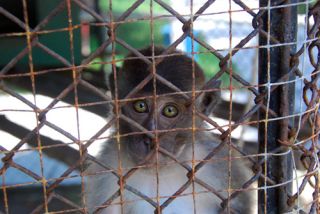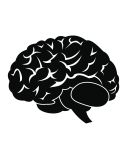Anxiety
Why Testing on Monkeys Won't Help Kids
The suffering that monkeys endure won't result in any benefits to human beings.
Posted October 9, 2014

By Sujatha Ramakrishna, M.D.
I was recently asked for my professional opinion, as a pediatric psychiatrist, on a controversial new NIH-funded research project at the University of Wisconsin-Madison. The experiment is similar to work done decades ago by Harry Harlow, in that it utilizes maternally deprived juvenile monkeys to study the effects of early adversity on young primate brains. Along with the current protocol, I reviewed articles previously written by the researchers, in order to understand their rationale and to determine if these types of experiments might contribute to the development of new psychiatric treatments which are helpful for children. To my dismay, not only have I come to the conclusion that the suffering that these monkeys endure will never result in any benefits to human beings, but I have also become gravely concerned for the psychological well-being of the children who are being targeted by the researchers for "treatment."
Justification for these new therapies was outlined in a 2012 University of Wisconsin paper:
"Although there are likely many mediators of AT, these gene expression data are consistent with a maladaptive neurodevelopmental hypothesis as a basis for AT. Future work should aim to extend these data in support of a molecular-neuroscientific rationale for conceptualizing new treatment strategies aimed at normalizing Ce function in vulnerable children before the development of the detrimental behavioral, emotional, and brain sequelae associated with the long-term consequences of chronic anxiety and depression."
Instead of attempting to diagnose DSM anxiety disorders in monkeys, which of course is impossible to do, researchers measure AT or "anxious temperament." AT has been described in various scientific journals as increased behavioural and physiological reactivity to mildly threatening stimuli, "behavioral inhibition," and "shyness."
It is important to remember that a combination of shyness and behavioral inhibition is not a mental illness. It's a personality trait. When monkey researchers say that they want to discover the "mediators of AT" as targets for intervention in "vulnerable children," they are talking about using psychotropic medications to alter a child's personality type.
The rationale for this approach is that because children with AT are more likely than non-inhibited children to develop anxiety disorders later in life, preventing the development of AT could also prevent the development of pathological anxiety. However, research has shown that the vast majority of shy/inhibited children will become normally functioning adults. In one such study, which was cited by UW researchers as justification for their work, only 17% of inhibited children went on to develop social anxiety disorder. While statistically significant when compared to non-inhibited children, this percentage is still very low. Therefore, using psychotropic medications to prevent AT would be inappropriate for the vast majority of "vulnerable children." Additionally, since the same study showed that AT has a protective effect against the development of disruptive behavior disorders, and a neutral effect on the development of other psychiatric disorders, there is a strong likelihood that these medications would make many children worse instead of better.
In my residency training programs at Northwestern University and The University of Chicago, I was taught that the medically responsible way to treat patients is to perform a comprehensive psychiatric evaluation, assign a DSM diagnosis, and formulate an individualized treatment plan. What the monkey researchers are proposing is a radical change from these recommended practice parameters, and it is a potentially harmful one. In fact, by recommending the alteration of gene expression to prevent children from developing AT, the researchers come dangerously close to the endorsement of eugenics.
Most mental health professionals in clinical practice want to help debilitated people return to their baseline level of functioning. Manipulating the developing personalities of children to achieve "normalcy" is not something that we are interested in. That might have been the goal of some psychiatrists in past centuries, but today we have an enlightened approach which accepts the fact that "normal" encompasses many different preferences, attitudes, and beliefs. I hope that more of us will begin to speak out against research projects which encourage us to mold personalities rather than heal illnesses. The mental health of our society and the ethical integrity of our profession are at stake.
Sujatha Ramakrishna, M.D. is a pediatric psychiatrist and author of the book Raising Kids Who Love Animals.


